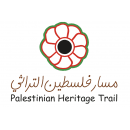Palestinian Heritage Trail (PHT) is a non-profit community-based tourism union that delineates, and develops PH Trail in and around different Palestinian localities. The organization endorses cultural diversity and exchange, safeguards tradition and heritage, inspires storytelling and encourages friendships based on the advancement of human values and the preservation of the surrounding environment and the people’s needs for further growth and education. PHT works closely and jointly with local communities to cultivate their resources, capacities and the opportunity for a better life.
Palestinian Heritage Trail (PH Trail) is a long-distance cultural hiking route in Palestine that was developed by PHT the organization in cooperation with the local communities. The trail is about 500 km long and extends from the village of Rummana northwest of Jenin to Beit Mirsim southwest of Hebron back to Artas in Bethlehem, in addition to the newly developed Jerusalem segment that starts in Eizariya through the Old City of Jerusalem towards the villages in the Northwest (Beit Suriq to Beit Duqqo). The trail passes through more than 60 Palestinian cities, villages and local communities where hikers can experience and enjoy the authentic Palestinian Hospitality.
The Palestinian Heritage Trail is more than just a hiking trail. It is a tool to meet and make connections between hikers from all over the world and local Palestinians. It is a route that leads hikers deep into the memory and heritage of Palestinian people, letting the chance to experience Palestinian life, exchange culture, make friends taste traditional dishes, which is one of Palestinian’s most fundamental traditions and through PHT partner service-providers such as trekking guides, homestays and guesthouses and women centers.
In 2022, PHT received a grant supported by the government of Japan Funded through the JSDF and the World Bank to implement “Increased Economic Opportunities and Improved Livelihood for Fragile Communities along the Palestinian Heritage Trail (PH Trail) in the West Bank” project. The objective of this project aims to benefit about 2,700 Palestinian individuals present in about 50 fragile communities along the Palestinian Heritage Trail across the West Bank. There will be a special focus on women and youth, as it is estimated that at least 40% of the beneficiaries will be women and 25% youth.
The project Components
Component 1: Community Driven Development
Sub-component 1.1: Tourism Communities Development- This activity will finance community- subprojects, including trainings and grants to improve community-based tourism experiences, start and grow their businesses, and improve the outreach and communication with tourists/visitors using digital means. Trainings and grants will support: (i) the establishment of new services providers along the PHT, like soap and olive making, wine production, glass and handcrafts making, and organic farming, first aid stops and rest areas. These experiences would offer tourists the opportunity to see how these items are traditionally made and buy products towards the end of their visits; (ii) Trail development activities including “within community” activities, such as inter-community walks, way-marking and signages, bike trails, city tours and so on; and (iii) specific trainings of individuals and communities on hygiene practices, cleaning and respecting the environment, and on foreign languages such as English, French, and other languages. This will also include a comprehensive “Managers of the Trail” training, developed by PHT with the participation of several stakeholders, to build the capacity of community leaders to sustainably develop and manage trail activities at community level.
Some of the activities of this sub-component will exclusively target women and youth, as for example some trainings will be only for women and beneficiary women will be offered peer to peer services and empowerment activities. Also, the implementation of the sub-component will follow a cluster approach and will strengthen the linkages among communities and their capacity to work together.
The funding under this sub-component will reach out to the communities through matching grants of approximately US$20,000 for beneficiary project, taking into consideration that communities will match the financing, contributing to 30% maximum of the activities associated costs. It is estimated that about 50 matching grants will be awarded to potential beneficiaries starting from the end of the first year of implementation.
Sub-component 1.2: Fostering Entrepreneurship- This activity will finance subprojects that foster entrepreneurship for startups and already existing businesses at an individual, firm-level, with focus on female and young entrepreneurs, to create new tourism experiences along the trail. Target beneficiaries will be mainly micro and small firms, most of which are informal. Sub-projects will finance activities such as: (i) training and technical assistance, including activities such as training on dynamics of entrepreneurship and skills for managing businesses, accounting and financial literacy, support for business registration, quality certification, and branding; (ii) activities to upgrade the business such as painting of some areas, cleaning and removal of every possible risk; and (iii) the provision of some small equipment such as bed for homestays, kitchen equipment, bathrooms updates and so on. The criteria for the selection of the activities and financing will be identified in the project operational manual.
A demand-driven approach will be implemented to encourage participation by the beneficiaries. The project will select entrepreneurs competitively, help them build up their business models, and provide financing to support their implementation. Overall, the Palestinian Private sector will partner with the PH Trail in the implementation of the activities of this sub-component.
The financing will be through matching grants that will benefit an estimated 40 beneficiaries (Palestinian individuals and firms) for an average amount of approximately US$8,000 per beneficiary. The matching grants will leverage investments from individual beneficiaries and the private sector since they will require a matching contribution. All the technical aspects and delivery mechanism of the matching grants will be finalized in the project manual.
Under both sub-components 1.1 and 1.2 of the community driven development component, the matching grants will finance only activities that will show potential results related to the PDO indicators (increased income, number of working hours created by the project, and number of individual beneficiaries). The matching grants will be implemented directly by PHT through a scheme that will incorporate international lessons learned by the Bank on several matching grants projects.
Sub-component 1.3: Promoting Outreach- This sub-component will support the development of an interactive digital platform for community-based tourism in the West Bank and some awareness and promotion activities to promote the most vulnerable groups and communities. The platform will include all information about homestays, guest houses, guides, artisan centers, trip itineraries, maps, and contacts. This will facilitate trips for increasing the number of individual travelers. The digital platform will leverage the wide connectivity of Palestinians to the internet through smart phones. It will also leverage the wealth of information and data sources that the implementing agency has accumulated over the last five years, including walking trail cartography, profiles of touristic sites, names and history of villages, and contacts and profiles of tour operators, wilderness guides, and homestays, to provide handy and accessible information to tourists/walkers, and to attract higher spending travelers. The platform will also allow for better tracking of community-based tourism performance statistics and trends.
The digital platform will include other partnerships (for example with international fitness companies, historical societies, National Geographic etc.), that could help to create and market “virtual cultural walks” where local guides could undertake the walk and share their experience, even if COVID resurges as well.
The sub-component will finance some awareness and promotion activities to promote the most vulnerable groups and communities to domestic and foreign visitors. They will focus on the promotion of the service providers like organized trips for tour operators, media and special interest groups, and on the provision of the service providers with the needed printed materials.
Component 2: Project Management and Administration, Monitoring and Evaluation, and Knowledge Dissemination
This component includes the following three sub-components: (i) Project Management and Administration; (ii) Monitoring and Evaluation; and (iii) Knowledge Dissemination.
Sub-component 2.1: Project Management and Administration: PHT will be the implementing agency of the project and this sub-component will mainly cover the costs of fiduciary staff (one procurement and one financial personnel), a project manager, some partial time of PHT director and of PHT gender Coordinator, and the project audits.
Sub-component 2.2, Monitoring and Evaluation: the first activity to be implemented under this second sub-component will be the tracking of project’s results and the achievement of the PDO indicators. This component will finance the hiring of a Monitoring and Evaluation and Environmental and Social Coordinator, a consultant to complete the ICR, and operating costs. To this purpose, a participatory monitoring and evaluation (M&E) approach will be introduced, which will promote socio-economic appraisals of the community-based projects and of the activities that will foster entrepreneurship. In addition, the M&E participatory approach will facilitate the ownership by the beneficiaries of the project activities.
Sub-component 2.3, Knowledge Dissemination: this last sub-component will finance the launching event and two dissemination events. One of these last two events will be in the field to share project results, lessons learned and project gains with major stakeholders, representatives of the Japanese government, donors, representatives of the private sector, and so on, while the second event will be in Washington DC.
PH Trail is seeking to hire a staff to fulfill the position of “Procurement Officer” to be in charge of processing all aspects of project procurement in accordance with the World Bank Procurement Regulations for Investment Project Financing Borrowers dated November 2020, the approved procurement plan and the Grant Agreement. He/she will be responsible for the following set of tasks:
- Provide advice and ensure that all procurement activities of the project and beneficiaries conform with the required World Bank’s Procurement procedures and policies.
- Conduct operational and procurement activities processing including:
- Assisting in the preparation of consultants’ terms of reference and administration of their contracts, including processing contract amendments.
- Drafting bid notices and bidding documents for inviting and obtaining bids for goods and services in accordance with World Bank Procurement Regulations.
- Drafting requests for expressions of interest and request for proposals (RFPs) for inviting and obtaining consultants’ services in accordance with World Bank Procurement Regulations.
- Assisting in revising the established procedures for receiving and opening of bids/proposals, ensuring adherence to the evaluation criteria stipulated in the bidding documents/RFPs in a professional and timely manner.
- Review and assess adequacy of beneficiaries' procurement in relation to grants activities.
- Maintaining complete procurement documentation for each contract, both in hard copy and in STEP (the World Bank’s System for Tracking Exchanges in Procurement) including bidding documents, advertisements, bids received, bid evaluations, letters of acceptance, contract agreements, securities, related correspondence, etc., in an orderly manner, readily available for audit.
- Preparing procurement reports when needed showing the status of ongoing procurement, including a comparison of planned and actual dates of the procurement actions, including preparation of bidding documents, advertising, bidding, evaluation, contract award and completion time for each contract.
- Preparing correspondence required for requesting, through the Project Manager, the World Bank approval of ‘no objection’ of the proposed procurement steps/decisions, through STEP or email, as required;
- Administer recruitment and contracts of key specialists for project implementation.
- Contribute to team effort by undertaking additional tasks and responsibilities as requested.
جميع الحقوق محفوظة لموقع جوبس.
For full TORs and full description of the main tasks and responsibilities, please go to link:
Terms of Reference – Procurement Speciliest
For more details and application form, please click on the following link and fill the Job Application Form: https://forms.gle/x9eBuk2ik8kb8rez7
After filling the Job Application Form, please send your CV and Cover Letter in English by email to: [email protected]
The Subject of the email should be M&E Coordinator
Deadline: Thursday, May 4, 2023
Without filling the Job Application Form and sending the CV and Cover Letter, the application will NOT be considered.
Applications that do not meet the specified minimum requirements or those that will be received after the closing date will NOT be considered.
Only short-listed will be contacted.









